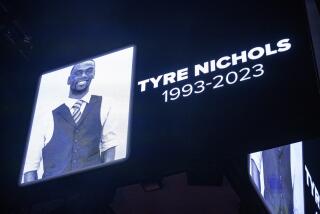Vandalism Trial Opens for 3 LAPD Officers : 39th and Dalton: Prosecutor says the men set out to level duplexes in drug raid. Defense denies a conspiracy.
Amid heightened awareness of police abuse, the trial of three Los Angeles policemen accused of wrecking two duplexes in a 1988 narcotics raid began Monday with the prosecutor alleging that the officers conspired to “level those residences and make them uninhabitable.”
In his opening statement to jurors in the courtroom of Municipal Judge Larry Fidler, Deputy Dist. Atty. Christopher Darden said more than 80 officers involved in the raid in the 3900 block of Dalton Avenue were offered protection against “consequences” by Southwest Division Capt. Thomas Elfmont, a defendant in the case.
“Capt. Elfmont told these officers that if they happened to . . . shoot someone, that the department would not scrutinize or look as closely at that officer-involved shooting as they normally did,” Darden said. “Capt. Elfmont told them they had carte blanche to do what they wanted to do. And he wanted those residences leveled.
“The officers destroyed just about everything inside those units,” the prosecutor said. “Refrigerators were chopped to pieces, televisions were busted . . . clothes were thrown to the floor and bleach was poured onto the clothes.”
In his opening remarks, Elfmont’s attorney, Barry Levin, denied that his client gave any officers a license to destroy property when they descended on the suspected drug houses Aug. 1, 1988.
“He was only telling his officers, ‘If you find any lawful reason at all, put them in jail,” he said. “The evidence may show somebody went too far, but it certainly wasn’t a giant conspiracy.”
Elfmont, Sgt. Charles Spicer and Officer Todd Parrick are each charged with vandalism and conspiracy to commit vandalism in the drug raid.
Before the beating of motorist Rodney G. King in Lake View Terrace last month, the 39th and Dalton incident was the most notorious misconduct case facing the Police Department.
A fourth officer charged in the Dalton case, Charles Wilson, earlier pleaded no contest to misdemeanor vandalism and agreed to testify against his fellow officers.
“Parrick was swinging his ax . . . chopping at everything,” Darden told jurors Monday. “Some officers even went outside because they didn’t want to get hit.”
Although many of the officers were “appalled” at what had happened, no one filed a complaint, the prosecutor said. He said this was because it was “assumed that defendant Parrick and the officers were only doing what they had been ordered to do.”
The 45-minute incident on Dalton cost the city more than $3 million in civil court settlements and resulted in disciplinary actions against dozens of police officers who demolished the two residences during their search for narcotics, paraphernalia, weapons and ammunition.
The raid resulted in the seizure of one rifle, 18.6 grams of rock cocaine and five ounces of marijuana. Thirty-three people were arrested, but only two teen-agers were charged with narcotics possession.
Darden said the raid was prompted by complaints from a family living in a home sandwiched between the duplexes about drug dealing in the streets, and about a shotgun blast that destroyed floodlights they had installed outside.
When the family declined to testify in court out of fear for their safety, police, led by Elfmont, decided to “make an impression” on the gang members who were selling rock cocaine two blocks from his station, Darden said.
In his arguments, Levin tried to shift part of the blame for the destruction on Wilson, who is expected to testify that he used a homemade battering ram to smash property at the duplexes.
“They (prosecutors) charged and brought before you the wrong people,” the defense lawyer said. “Why the prosecution of Capt. Elfmont? The reasons are one great misunderstanding about how the Police Department operates; a twisting of words; anger; frustration, and holding someone responsible for excessive damage that occurred out there.”
Attorney Michael Stone, who is representing Spicer, suggested that the officers were simply being thorough in their searches for drugs when they ripped up carpeting, broke toilets, smashed staircases and poked holes through walls.
Serving search warrants on fortified rock houses in South Los Angeles are almost always “violent, loud, traumatic events,” the lawyer said.
More to Read
Sign up for Essential California
The most important California stories and recommendations in your inbox every morning.
You may occasionally receive promotional content from the Los Angeles Times.











